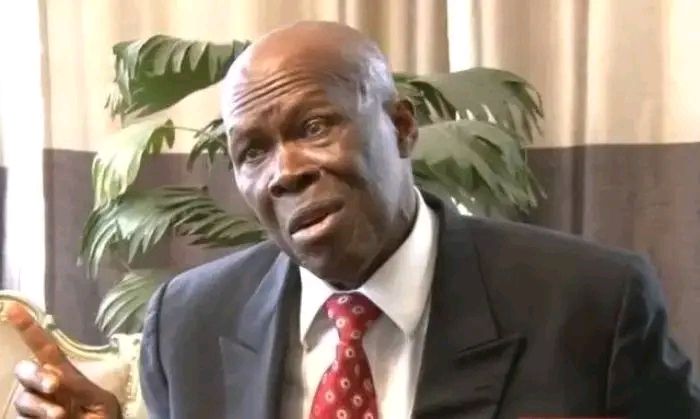The Ndi-Igbo Intellectual and Cultural Development Organization (NIDO), a pro-Igbo pressure group, has said that the June 12 Democracy Day Celebration is covered with injustice should the late Professor Humphrey Nwosu not be recognized.
NIDO went further to stress that the whole show amounts to a double standard without due recognition for Professor Humphrey Nwosu, the late National Chairman of the electoral umpire that conducted the June 12, 1993, presidential poll, adjudged to be the most credible election in Nigeria’s history.
In a statement, the group said it was unacceptable injustice for Nigeria to name June 12 as Democracy Day in recognition of Moshood Abiola, the presumed winner of the presidential election, and refuse to honour Professor Nwosu, who conducted the poll, which was both locally and internationally acclaimed to be credible.
In the statement signed by its Director of Communications and Information, Dr. Christian Afulike, NIDO urged President Bola Tinubu, as a matter of urgency, to correct the injustice and name a befitting national edifice after Nwosu in recognition of his invaluable contributions towards Nigeria’s electoral process and democracy.
The Igbo group said Nwosu deserves immortalisation in recognition of his patriotic spirit and as an encouragement to personnel of serving and future electoral umpires.
The statement also urged the Anambra State Government, Nwosu’s home state, to also name a major edifice after him.
“With President Muhammadu Buhari officially recognising the June 12, 1993 election and its outcome, the Nigerian state seems to have relapsed into a state of deliberate amnesia, as there is no mention of the umpire who courageously and meticulously oversaw the elections.
“Late Prof. Humphrey Nwoasu’s indelible contributions to Nigeria’s electoral process seem to have been deliberately forgotten by a nation that delights more in celebrating mediocrity.
“Without a doubt, it reeks of double standards to recognise the election as the most credible in the history of elections in Nigeria, recognise the outcome of the election, and at the same time pretend to forget the brain behind the entire process.
“This is unacceptable and is surely at the heart of the abysmally poor performance of Nigeria’s electoral body in all other elections conducted in the country since then.
“We, therefore, condemn without reservations, this deliberate act of denying Prof. Humphrey Nwosu the honor that he deserves by successive governments at both the federal and state levels, as such is the recipe for the poor performance of subsequent electoral umpires in the country, leading to the current sorry state of governance in the country.
“We equally demand due recognition and celebration of Prof. Humphrey Nwosu through the naming of a befitting national edifice representative of any of our democratic institutions after the late egghead and proponent of “option A4.”
“This gesture will serve to encourage serving and future electoral umpires in the country to serve with diligence and integrity, thereby strengthening the nation’s democracy beyond the ritual of electoral reforms,” the statement read.
NIDO, in the statement titled “Erasing the Double Standard of the Nigerian Government,” said that it was a milestone for Nigeria to record 24 years of unbroken democracy but emphasized the need to appreciate “the sacrifices of Nigeria’s heroes who fought and made various degrees of sacrifices to ensure a return to constitutional governance in 1999, thereby aligning Nigeria with the rest of the free world.”
It went further to say, “The celebration of Nigeria’s Democracy Day on June 12 as against May 29 of each year (which is the day set aside to swear in elected presidents/governors in the country) effective June 6, 2018, by President Muhammadu Buhari is in remembrance of Nigeria’s most credible election on June 12, 1993, and in honour of the winner of that election, Moshood Kashimawo Olawale (MKO) Abiola, who died in detention in the course of the pursuit for the actualisation of his mandate.
“This represents a scant atonement for the brutal deprivation and denial of the mandate freely given by Nigerian citizens through the most credible elections the country has ever witnessed to MKO Abiola and the killing of his wife Kudirat and many other Nigerians who paid the supreme price in the wake of the struggle for the restoration of Nigeria’s democracy.
“As Nigeria observes the day, it is an opportunity to reflect on the gains and pains of today’s democratic governance riding on the back of seven successive national elections in 1999, 2003, 2007, 2011, 2015, 2019, and 2023 under different electoral umpires.
“Without a doubt, a review of each of these elections only leads to an assessment of which is worse than the other in terms of all known indices of assessment of elections.
“The consistent clamour for electoral reforms to date and now periodic amendments to the Electoral Act depicts a sick electoral system that negatively impacts governance at different levels and results in growing discontent and lack of trust in Nigeria’s elections and democracy.”















